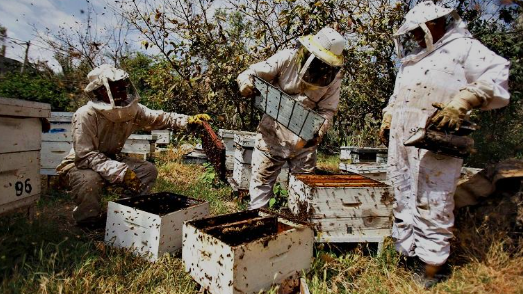
In the vibrant tapestry of Nigeria’s agricultural landscape, one occupation stands out as a crucial contributor to biodiversity, pollination, and honey production—the apiarist, commonly known as a beekeeper. The role of beekeepers extends beyond the management of beehives; it involves the delicate dance with nature’s most industrious pollinators, honeybees. This exploration delves into the fascinating world of apiarists in Nigeria, shedding light on their responsibilities, challenges, the economic impact of beekeeping, and the vital role they play in the sustainable development of the country.
Beekeeping in Nigeria: A Historical Perspective
Beekeeping is not a new practice in Nigeria; it has deep historical roots that intertwine with the diverse cultures and communities across the nation. Indigenous knowledge of beekeeping methods and the importance of honey as a natural sweetener and medicinal substance has been passed down through generations.
Traditionally, various ethnic groups in Nigeria have engaged in beekeeping using methods suited to local conditions. Hollowed logs, woven baskets, and other locally available materials were used as beehives. The honey obtained served both as a culinary delight and a valuable commodity for trade.
In recent decades, there has been a growing recognition of the economic and ecological importance of beekeeping, leading to increased interest and investment in the apiculture sector. The government, non-governmental organizations (NGOs), and private enterprises have played roles in promoting sustainable beekeeping practices and providing support to beekeepers.
The Role of the Apiarist in Nigeria
Beekeeping Practices
The apiarist, or beekeeper, is the guardian of honeybee colonies. Their primary responsibilities revolve around the care and management of beehives, ensuring the health and productivity of the honeybee population. Beekeepers engage in a range of practices, including:
- Hive Installation and Maintenance: Apiarists set up beehives in suitable locations, considering factors such as sunlight, wind direction, and accessibility. Regular maintenance involves inspecting hives for signs of disease, ensuring structural integrity, and providing supplementary feeding when necessary.
- Swarm Control: Beekeepers manage the natural process of swarming, where a portion of the colony leaves to establish a new hive. Effective swarm control helps prevent the loss of valuable bee colonies.
- Harvesting Honey and Other Bee Products: The harvesting of honey is a key aspect of beekeeping. Apiarists employ various techniques to extract honey from the comb while minimizing disruption to the hive. In addition to honey, beekeepers may collect beeswax, propolis, royal jelly, and pollen, each with its unique value.
- Pollination Services: Beyond honey production, honeybees are essential pollinators for many crops. Apiarists contribute to agricultural ecosystems by providing pollination services, helping increase crop yields and enhance biodiversity.
Types of Beekeeping in Nigeria
Beekeeping practices in Nigeria vary, reflecting the diverse ecological zones, cultural contexts, and economic considerations. Some common types of beekeeping in the country include:
- Traditional Beekeeping: This involves using traditional hives made from locally available materials, such as logs or woven baskets. Traditional beekeeping methods are often practiced by rural communities and are integral to cultural practices.
- Modern Beekeeping: With advancements in beekeeping technology, modern methods involve the use of movable frame hives. These hives allow for better hive management, inspection, and honey extraction. Modern beekeeping is often adopted by commercial beekeepers and those focused on maximizing honey production.
- Urban Beekeeping: In urban areas, individuals and organizations may engage in beekeeping on a smaller scale, often using modern hives. Urban beekeeping contributes to local biodiversity and provides an opportunity for city dwellers to connect with nature.
Economic Impact of Beekeeping
The economic impact of beekeeping in Nigeria is multifaceted, contributing to both rural livelihoods and national economies. Several aspects highlight the economic significance of beekeeping:
- Honey Production and Sales: Honey is a valuable commodity with a growing demand in local and international markets. Beekeepers contribute to honey production, generating income through the sale of honey and related products.
- Employment Generation: Beekeeping creates employment opportunities along the value chain. From hive construction to honey processing and marketing, various individuals are involved in beekeeping-related activities, contributing to job creation.
- Pollination Services for Agriculture: The pollination services provided by honeybees benefit agricultural productivity. Beekeepers who offer pollination services to farmers contribute to increased crop yields and improved quality of fruits and vegetables.
- Export Opportunities: Nigeria has the potential to tap into international markets for honey and bee products. By meeting quality standards and adhering to sustainable practices, Nigerian beekeepers can explore export opportunities, further boosting the national economy.
Environmental Conservation
Beyond the economic impact, beekeeping plays a crucial role in environmental conservation. Honeybees, as pollinators, contribute to the reproduction of flowering plants, including many food crops. The biodiversity and ecosystem services provided by honeybees are invaluable for maintaining ecological balance.
Apiarists, by promoting sustainable and bee-friendly practices, contribute to the conservation of bee populations and other pollinators. This, in turn, supports the health of ecosystems, enhances agricultural biodiversity, and ensures the availability of diverse food sources.
Challenges Faced by Apiarists in Nigeria
While the role of apiarists in Nigeria is significant, they face several challenges that impact their ability to thrive and contribute fully to the apiculture sector:
Limited Access to Resources
- Lack of Training and Education: Many beekeepers, especially in rural areas, may lack access to formal training and education in modern beekeeping practices. This hampers their ability to adopt efficient and sustainable methods.
- Insufficient Infrastructure: Limited access to basic infrastructure, such as roads and transportation, can hinder the movement of beekeeping equipment, honey, and other bee products to markets.
Health of Bee Colonies
- Pests and Diseases: Bee colonies are susceptible to pests and diseases, such as Varroa mites and foulbrood. Controlling these threats requires knowledge, resources, and often, the use of specific treatments.
- Pesticide Exposure: The use of pesticides in agriculture poses a risk to honeybee populations. Apiarists may face challenges in ensuring that their bees have access to pesticide-free forage.
Market Access and Value Addition
- Limited Market Opportunities: Some beekeepers struggle to find reliable markets for their honey and bee products. Establishing market linkages and accessing broader markets can be challenging, particularly for small-scale beekeepers.
- Value Addition: Adding value to bee products, such as processing honey into various products like beeswax candles, royal jelly, or cosmetics, requires additional skills and resources. Limited access to processing facilities may impede value addition.
Climate Change
- Climate Variability: Changes in weather patterns and climate variability can impact flowering seasons, affecting the availability of forage for honeybees. Apiarists may need to adapt their practices to cope with these changes.
- Loss of Forage and Biodiversity: Deforestation and land-use changes can lead to the loss of natural forage for bees. Maintaining biodiversity is essential for the health and resilience of honeybee populations.
Innovations and Opportunities for Apiarists
Technology Adoption
- Beekeeping Apps: Mobile applications designed for beekeepers can provide valuable insights, such as hive monitoring, disease detection, and weather forecasts. These apps empower beekeepers with real-time information.
- Smart Hives: Technologically advanced beehives equipped with sensors can monitor hive conditions, temperature, and humidity. Smart hives offer a data-driven approach to beekeeping, enabling more informed decision-making.
Training and Capacity Building
- Training Programs: Government agencies, NGOs, and private organizations can collaborate to provide training programs for beekeepers. These programs can cover modern beekeeping techniques, pest management, and business skills.
- Skill Development: Investing in the skill development of beekeepers, particularly in value addition and marketing, can enhance their capacity to compete in the market and increase their income.
Market Linkages and Certification
- Certification Programs: Participating in certification programs, such as organic or fair trade certifications, can open doors to premium markets for beekeepers who adhere to sustainable and ethical practices.
- Establishing Cooperatives: Beekeepers can form cooperatives to collectively access markets, share resources, and negotiate better prices. Cooperatives provide a platform for collaboration and mutual support.
Research and Extension Services
- Research on Local Bee Varieties: Research initiatives can focus on understanding and conserving local bee varieties that may be better adapted to specific ecological conditions in Nigeria.
- Extension Services: Strengthening extension services that provide beekeepers with information on best practices, disease management, and sustainable beekeeping methods is crucial for the growth of the sector.
Climate-Resilient Practices
- Diversification of Forage: Encouraging beekeepers to diversify the forage available to their bees can mitigate the impact of climate variability. Planting a variety of bee-friendly crops can ensure a more consistent food source.
- Natural Resource Management: Promoting sustainable land-use practices and conservation of natural resources contributes to maintaining biodiversity and supporting the health of honeybee populations.
The Future of Beekeeping in Nigeria
The future of beekeeping in Nigeria holds promise and potential, provided concerted efforts are made to address challenges and leverage opportunities. The sector stands at a crossroads where sustainable practices, technological innovations, and market-driven approaches can propel it forward:
Sustainable Practices for Beekeeping
- Agroecological Approaches: Embracing agroecological approaches that integrate beekeeping into diverse agricultural systems can enhance the resilience of honeybee populations and contribute to sustainable food production.
- Conservation of Indigenous Bee Species: Recognizing and conserving indigenous bee species is essential for maintaining biodiversity and ensuring the adaptability of bee populations to local ecological conditions.
Market-Driven Approaches
- Market-Oriented Training: Providing beekeepers with market-oriented training can empower them to meet quality standards, explore value addition, and position themselves in both local and international markets.
- Brand Building: Building strong brands for Nigerian honey and bee products can enhance their market appeal. Highlighting the unique qualities of locally produced honey can create a niche in the market.
Policy Support and Collaboration
- Policy Frameworks: Developing supportive policy frameworks that address the specific needs of beekeepers, including access to resources, training, and market linkages, is crucial for the growth of the sector.
- Public-Private Partnerships: Collaboration between government agencies, private enterprises, and NGOs can create synergies that support the sustainable development of beekeeping in Nigeria. This includes initiatives for research, training, and market development.
Community Engagement
- Community-Based Approaches: Engaging local communities in beekeeping initiatives fosters a sense of ownership and ensures that the benefits of apiculture are distributed equitably.
- Youth Involvement: Encouraging youth involvement in beekeeping by providing training, resources, and mentorship can inject new energy into the sector and address the challenge of an aging beekeeping population.
Research and Innovation
- Research on Climate-Resilient Beekeeping: Investing in research on climate-resilient beekeeping practices and technologies can help beekeepers adapt to changing environmental conditions.
- Innovation Hubs: Establishing innovation hubs for beekeepers to access information, technology, and resources can catalyze innovation within the sector.
Conclusion
In the bustling fields, orchards, and forests of Nigeria, apiarists play a vital role as stewards of honeybee colonies, custodians of biodiversity, and contributors to the economic fabric of the nation. The journey of beekeeping in Nigeria, shaped by tradition and propelled by innovation, weaves together the threads of environmental conservation, economic empowerment, and the sweet harvest of honey.
As the nation stands at the cusp of agricultural transformation, the role of apiarists becomes increasingly pivotal. Their contributions extend beyond honey production; they are guardians of pollination, advocates for sustainable practices, and ambassadors for the importance of honeybees in maintaining the delicate balance of ecosystems.
The challenges faced by apiarists are real, but so are the opportunities for growth, innovation, and positive impact. With a concerted effort from government bodies, non-governmental organizations, the private sector, and the beekeeping community itself, Nigeria can unlock the full potential of its apiculture sector.
In the buzzing world of Nigerian beekeeping, each hive tells a story—a story of resilience, collaboration, and the timeless dance between humans and honeybees. As apiarists tend to their colonies, they are not just cultivating honey; they are nurturing livelihoods, safeguarding ecosystems, and leaving a lasting legacy for generations to come. The future of beekeeping in Nigeria holds the promise of a sustainable and thriving sector, where the hum of bees echoes the harmony between nature and those who tend to its buzzing wonders.







